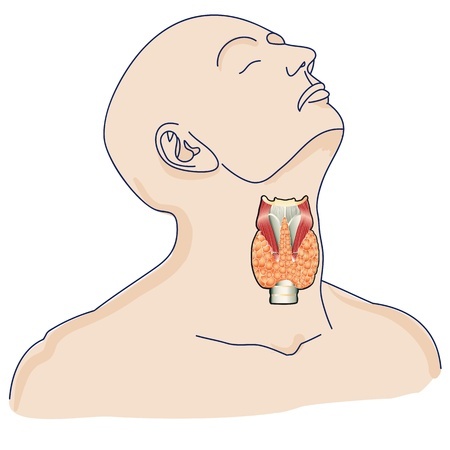
Table of Contents
Last Updated on
A healthy thyroid is essential to keeping you feeling your very best. The tiny thyroid gland, located in your neck just above the Adam’s apple, produces a hormone that is responsible for regulating your metabolism, heart rate, body temperature, and even some brain function. Too much or too little of this thyroid hormone (TH) can easily begin to cause degeneration in many basic bodily functions. Luckily, the thyroid sends out signs of distress when the TH it produces is too low or too high. Some of the most common signs can be easily ignored, but spotting the symptoms of a thyroid problem can mean earlier treatment, and better overall health.
 1. Rapid Weight Gain
1. Rapid Weight Gain
If your diet and exercise habits haven’t changed, but you’re still afraid of the climbing number on the scale, it might be time to go see a doctor. An underactive thyroid, or hypothyroidism, can be the culprit of mysterious weight gain. The thyroid’s reduced production of TH causes metabolism to slow, and when your body cannot metabolize quickly enough, you could begin to pack on the pounds. If the weight seems to fall off without a change to your daily routine, it can be just as concerning. This could be due to an overactive thyroid, or hyperthyroidism. In this case, the overproduction of the thyroid hormone causes the body to metabolize too quickly, resulting in a dwindling number on the scale. Your weight gain or loss can also be a symptom of other health concerns.
2. Fatigue
Everyone loses a little sleep on occasion, but if your eight hours aren’t keeping you peppy, it could be another sign of hypothyroidism. Once again, too little TH in your blood wreaks havoc, this time in your muscles. The hormone can stimulate muscles to work efficiently, so they may begin to feel sluggish without the TH. Fatigue is, in fact, one of the most common signs of an issue with the thyroid. It might be helpful to supplement your diet with thyroid support complexes.
3. Unbalanced Body Temperature
Is staying between ‘too hot’ and ‘too cold’ becoming an issue? If so, a thyroid problem is once again a possible cause. A thyroid that produces too much TH makes cells go crazy with energy-burning, which creates heat. When that happens, the body can feel too hot, and begin to make copious amounts of sweat. On the other side of the spectrum, hypothyroidism has an opposite effect: the cells affected lose their capacity to burn energy efficiently. As a result, there is less heat produced, which can make your body feel strangely cold, or even cause sudden chills. If the room temperature never seems comfortable, take a better look at your diet or check with your doctor regarding your thyroid levels.
 4. Hair Loss
4. Hair Loss
You know the hair on your head pretty well, but does it seem thin and break easily? Don’t blame your conditioner just yet; it could be another sign of a thyroid in distress. Hypothyroidism’s lower TH levels ‘turn off’ too many of the hair follicles, not just on your head, but over your entire body. When the hair falls out, the follicle doesn’t get the message to replace it, so your lustrous locks start to look more brittle and sparse. If your eyebrows are rapidly losing hair, as well, start looking into an underactive thyroid. Of course, a hyperactive thyroid can be just as harmful to your beautiful mane, as the TH-overstimulated follicles can’t replace the hair as fast as the thyroid tells it to fall out!
5. Depression
While depression is a big enough problem in itself, hypothyroidism could have had a hand in causing it. Lower than usual levels of TH in the brain can begin to mess with its production of serotonin, which is the hormone that makes you feel good. When the brain can’t produce enough of the serotonin due to low thyroid hormone, it can make you feel unusually sad. This is a very serious symptom on its own or coupled with a thyroid issue, so if you begin to feel depressed, talk to a doctor about the possibility of hypothyroidism affecting your mood.
If you suspect a thyroid problem and have talked to your doctor, ask about the thyroid stimulating hormone (TSH) test. It can help identify whether or not your thyroid is functioning normally, so you can begin treatment on synthetic hormones that will help balance your TH levels. It might be helpful to take thyroid supplements as well. Of course, the sooner you seek treatment, the sooner you will begin to feel better!
